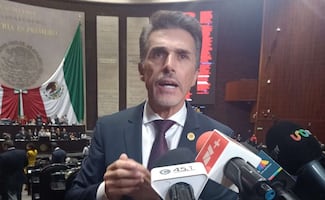Más Información

Trabajamos para frenar el flagelo del fentanilo: embajador Johnson; destaca encuentro con gabinete de Seguridad

Dos directivas del DIF Estatal Oaxaca quedan a disposición del MP por muerte de dos niñas haitianas; las menores fueron halladas en fosa séptica

Diputados aprueban reforma para reducir jornada laboral de 40 horas hasta 2030; la mandan a las legislaturas locales

Morena suspende derechos políticos de Sergio Mayer; Comisión de Honestidad señala "impacto negativo a imagen del movimiento"

Abren 7 investigaciones contra funcionarios por huachicol fiscal, revela Sheinbaum; “sin distinción de jerarquías o filiaciones políticas”

Matan a balazos a exsubprocurador de Delitos de Alto Impacto en Baja California Sur; despliegan operativo para dar con responsables
Cable TV services offer an option to establish a parents' access code to block children from viewing certain content. At home, this is an autonomous decision made by the family. However, establishing a similar rule among the population in general and turn it into law would spark a debate. For example, it could interfere with sex education taught at school.
At least 13 states are working on similar actions so that parents authorize what is taught at school , and ban issues such as gender equality, and sexual and reproductive health.
In most cases, those behind these initiatives are conservative NGOs that have the support of political parties in their mission to reform education.
The proposal was rejected and dismissed by the Nuevo León Congress. In Aguascalientes, the Human Rights Commission contested the education reforms announced by the state government.
Recommended: Lack of information and sex education, the obstacles to condom use in Mexico
The reforms are moving forward without the diffusion a proposal like this requires.
Furthermore, the proposals violate the children’s rights established in the International Convention for the Rights of the Child and the Mexican Constitution , as the latter establishes several things that go against the conservative laws proposed by NGOs and political parties. Moreover, the Constitution dictates the government will prioritize children's and teenagers’ access, permanence, and participation in education. It also establishes that the government is in charge of education.
It is not enough for the Interior Ministry and the National Human Rights Commission to say they are against the parental veto because the reforms are still moving forward despite also being rejected by international organizations.
Some parents are attempting to sop children from receiving sex education and reproductive health. However, the situation is worsened by the complicity of lawmakers.
gm
Noticias según tus intereses
[Publicidad]
[Publicidad]








